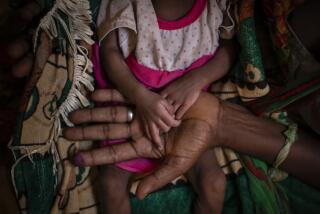Group Shouldn’t Snicker at Person’s Pain : When disasters occur, Good Samaritans step forth. But individuals in distress need help too.
- Share via
One morning, I waited in a group at Kinko’s when someone shouted, “She’s not wearing a stitch.” We looked out and saw a naked woman with tangled, blond hair hanging past her shoulders walking north on Pacific Coast Highway.
The group snickered, and I twice yelled, “Call 911.” The man behind the counter ignored my directions, saying, “Someone will.” An elderly female customer making copies snorted contemptuously at the woman drifting down the sidewalk.
I didn’t do anything else.
Recently, Good Samaritans abounded as L.A. dealt with its crisis. The earthquake challenged the whole population because many were affected. When conditions threatened survivors, everyday saints came out of corners to save lives and offer shelter, water, food, clothing and comfort.
In those rumbling 20 seconds, a new community formed in which norms were reset and social boundaries expanded and adjusted. There were shared risks and new heroes who met our needs, as life’s price anted up during this emergency. The need for community action and service was widespread. Perhaps, many discovered goodness they hadn’t realized before.
A group can behave differently, though, when the crisis belongs to an individual.
When one suffers, we stare amazed, and consider personal safety or liability when involvement comes to mind.
We may feel compassion while wondering what the individual did to deserve misfortune. “How terrible,” we think, or “Better you than me.” The other guy’s problem is still the other guy’s, or maybe it’s a trick. These days, who can be blamed for such caution? We hesitate, paralysis results, then shame may follow--or worse.
That morning, I stood with the worst.
They reacted callously to the naked lady, and feeling numb, I apparently feared separating from them. She was in trouble; yet instead of showing sensitivity, a few were disgusted, most were amused, and one felt numb.
On a daily basis, is our culture, finally, too Beavis-and-Butt-Head-ized? Is helping only the purview of public disasters? Some say laughter is a nervous reaction, but laughter at suffering should never be accepted without question.
A group can be evil’s vehicle. Unfortunately, I experienced bystander passivity, and it may be evil’s way into the human spirit. If the individual perceives evil, fear of the group’s response prevents the individual from taking right action. Underneath “bystanderism” lies the dread--what if they laugh at me, too, or worse? More awful are degrees of bystanderism, and believing passive participation in another’s humiliation is natural--like the child shouting “Goodby, Jews” in “Schindler’s List.”
As a group member, the individual displays group principles, regardless of personal beliefs. In “A Boy’s Life,” Tobias Wolff writes, “ . . . any image of myself, no matter how grotesque, had power over me.” Many individuals are subject to powerful personal images as group members. Isn’t that ironic?
True, the tendency to group helps some manifest good; shared disaster and most religious groups can strengthen people for good, and 12-step, self-help groups (surely an oxymoron) can provide valuable blueprints for living. Yet the question remains, why do groups formed around evil get such a hold over individuals?
Many times, I’ve relived that morning at Kinko’s, fantasized rushing out, pulling the blanket from my car and wrapping the naked woman in it. Truth is, I stood with this snickering, instantly formed group of clothed adults and let the naked woman drift past. I drove off to teach an English class at a local college. I told them what happened, and one student asked why I didn’t help. I had no answer, just shame.
I no longer believe a Good Samaritan will pop up if something bad happens, because most bystanders laugh, tsk their tongues, freeze, or look the other way. We’re losing to our fears.
The woman walked another block before a dry cleaner’s employee rescued her and called the police. Turns out, she’d been beaten by her boyfriend who then threw her naked into the street. Thankfully someone eventually helped her, but God help the ones who stood by--and stand by when evil acts.
Forgive me, Naked Stranger. That morning you passed by earth-shaken, beaten, and disguised in nakedness, while I froze between knowledge and fear. Next time, I won’t. I can’t.
More to Read
Sign up for Essential California
The most important California stories and recommendations in your inbox every morning.
You may occasionally receive promotional content from the Los Angeles Times.













